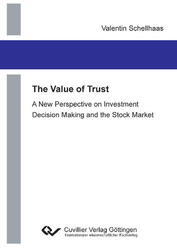| Fachbereiche | |
|---|---|
| Buchreihen (97) |
1381
|
| Nachhaltigkeit |
3
|
| Gesundheitswesen |
1
|
| Geisteswissenschaften |
2370
|
| Medienwissenschaften | 16 |
| Theologie | 57 |
| Philosophie | 102 |
| Rechtswissenschaft | 423 |
| Wirtschaftswissenschaften | 852 |
| Sozialwissenschaften | 417 |
| Sportwissenschaften | 48 |
| Psychologie | 233 |
| Pädagogik | 190 |
| Geschichtswissenschaften | 183 |
| Kunstwissenschaften | 111 |
| Kulturwissenschaften | 166 |
| Literaturwissenschaften | 117 |
| Sprachwissenschaften | 88 |
| Naturwissenschaften |
5407
|
| Ingenieurwissenschaften |
1798
|
| Allgemein |
98
|
|
Leitlinien Unfallchirurgie
5. Auflage bestellen |
|
Erweiterte Suche
The Value of Trust
A New Perspective on Investment Decision Making and the Stock Market
Valentin Schellhaas (Autor)Vorschau
Inhaltsverzeichnis, Datei (23 KB)
Leseprobe, Datei (47 KB)
This book aims at introducing a new perspective on stock market behavior by developing a theory of trust in investment decision making, discussing its relevance and applicability to account for anomalies of investor behavior, and empirically testing propositions derived from this theory.
Current economic research on investor behavior is still mainly dominated by rational choice, though – thanks to behavioral finance – select psychological factors have been largely acknowledged. Yet factors that go beyond a psychologically extended idea of rationality are still highly underrepresented in research, especially the role of emotions. Drawing upon research in psychology, sociology, and philosophy, trust is proposed as a concept to encompass the entirety of cognitive and affective aspects influencing decision making beyond strict rational choice. Trust offers an intuitive and integrative concept which complements ‘hard’ economic criteria and allows for a more holistic understanding of investor behavior. This approach opens up a new perspective on the role of trust in investment decisions on a firm-specific level (to account for cross-sectional differences) and on a global level (regarding, e.g., a global financial crisis). A definition of firm-specific trust in investment decisions is developed as the cognitive belief and emotional impression an investor has attained of the trustworthiness of a firm – complementing strict rational choice based on objective economic criteria. Additionally, a theoretical framework of investment decision making is proposed and hypotheses for future research are derived.
A short review of finance theory shows that approaches which employ some form of bounded or psychologically amended rationality achieve better accounting for behavior ‘anomalies’ than classic finance theory approaches, but lack an integrative perspective and still underestimate the influence of emotions and moods for investment decisions. The new theory of trust as an alternative approach is found to yield a more holistic understanding of actual investor behavior than the fairly disparate behavioral finance approaches which only deal with selective anomalies – thus seconding its applicability for the economic context.
The paper also delivers empirical support for hypotheses derived from the new theory – indicating that the aggregate trust perceptions of investors regarding a firm contribute to cross-sectional differences of stock performance. As firm-specific trust is defined as orthogonally complementing rational choice decision criteria based on objective economic company information, it is measured as the residual in a multilevel analysis which employs a rational choice market model and fundamental company data common to classic finance approaches. Using European market data of the past ten years, analyses in this paper find this firm-specific trust to incrementally contribute to subsequent firm performance and cross-sectional differences – in addition to rational choice based on market equity, price-book ratio and firm-specific volatility. The measure of trust is found to be fairly stable over time, and a higher level of trust robustly and significantly contributes to superior firm performance – though in some occasions superimposed upon by a contrary effect of other predictors. Additionally, some empirical support is found for the proposition that the salience of firm-specific trust as a differentiating factor increases in times of market crisis and decreases in times of market boom. The findings hint at the potential of employing trust for a broader perspective on investment decision making and amending strict rational choice models of classic finance theory. Furthermore, gaining its investors’ trust seems to be a competitive advantage for firms and may serve as a buffer against larger stock declines, especially in times of a crisis.
All in all, the new theory of trust is backed by research insights from various disciplines, proves its applicability and relevance to account for known phenomena of investor behavior, and receives strong empirical support for propositions derived from it. Employing this concept of trust additionally allows reconciling classic finance theory with psychological drivers in investment decision making and opens up a new perspective for future research on investment decisions.
| ISBN-13 (Printausgabe) | 3869553952 |
| ISBN-13 (Printausgabe) | 9783869553955 |
| ISBN-13 (E-Book) | 9783736933958 |
| Sprache | Englisch |
| Seitenanzahl | 188 |
| Auflage | 1 Aufl. |
| Band | 0 |
| Erscheinungsort | Göttingen |
| Promotionsort | Ludwig-Maximilians-Universität München |
| Erscheinungsdatum | 13.07.2010 |
| Allgemeine Einordnung | Dissertation |
| Fachbereiche |
Wirtschaftswissenschaften
Psychologie |








